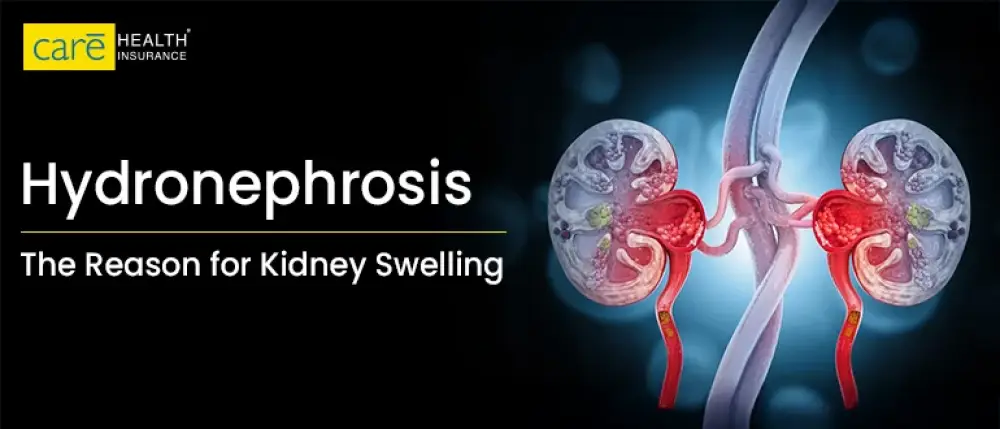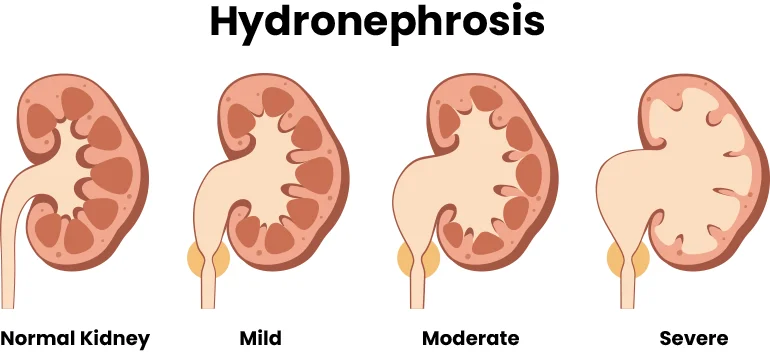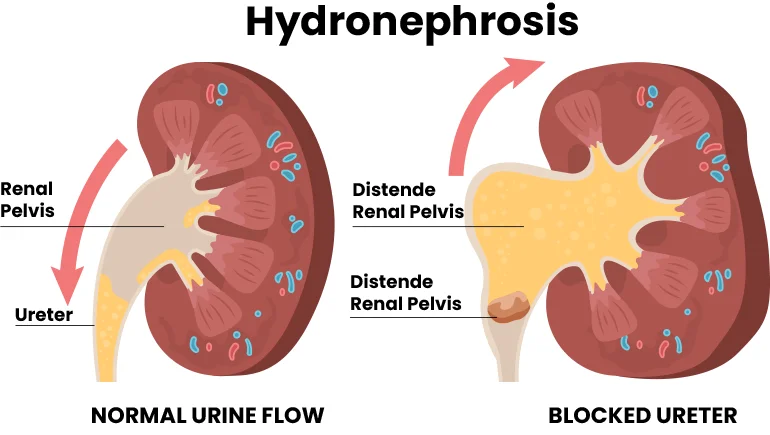Subscribe to get weekly insights
Always stay up to date with our newest articles sent direct to your inbox
Published on 17 Sep, 2025
Updated on 18 Sep, 2025
876 Views
4 min Read

Written by Sejal Singhania
Reviewed by Munmi Sharma
favorite1Like
Have you ever had a persistent backache or seen swelling in your abdomen and assumed it was just gas? Sometimes, our body gives subtle signals of a more serious problem developing inside. One such hidden condition is hydronephrosis, which many people remain unaware of until it becomes serious.
Mild Hydronephrosis may seem like a complicated and serious issue, but in simple terms, it means swelling in the kidney due to the accumulation of urine. Yes, your kidney is waterlogged. Although it may seem alarming, the good news is that if hydronephrosis is treated promptly, it can be managed and is rarely life-threatening.
Let's take a closer look at this condition to understand the hydronephrosis causes, symptoms, and treatments. By learning more about it, we can better care for our kidneys and maintain their health.
Hydronephrosis refers to the swelling of one or both kidneys caused by urine buildup. This condition often results from a blockage in the urinary drainage tubes, which can occur anywhere from the kidneys to the bladder. It comes in various forms and can happen at any age. When only one kidney is affected, it is referred to as unilateral hydronephrosis, whereas affecting both kidneys is known as bilateral hydronephrosis.
Hydronephrosis can occur across different age groups, but it's common during pregnancy, affecting up to 80% of women in their second trimester. Hydronephrosis in pregnancy can range from a bit of discomfort to more serious issues, often causing symptoms like flank and abdominal pain.

Symptoms of hydronephrosis vary depending on whether the swelling occurs suddenly or develops gradually. Occasionally, chronic hydronephrosis develops over time and may not present any specific symptoms. Antenatal hydronephrosis in infants typically does not cause symptoms after birth. However, some common signs of hydronephrosis that may be observed include:
A blockage or obstruction in the urinary tract is most commonly the cause of hydronephrosis. Various conditions can lead to this, with the most frequent being in adults. Some of the causes of mild hydronephrosis may include:

Mild hydronephrosis can happen to people of any age, but it is more common in these groups:
Hydronephrosis treatment varies depending on the underlying cause, identified through the patient's clinical diagnosis. Healthcare providers diagnose hydronephrosis using a combination of physical exams, laboratory tests, and imaging techniques. Some of these include:
Treatment for hydronephrosis primarily focuses on removing the obstruction that blocks urine flow. The specific treatment your doctor recommends will depend on the underlying cause of the blockage. Here are some common causes and their corresponding treatment options:
Bonus Tip: Drinking plenty of water and maintaining a balanced diet can help prevent kidney problems. However, issues such as hydronephrosis can affect anyone- children, adults, or seniors. Kidney treatments like surgery, hospitalisation, or advanced scans can be costly. With Care Health Insurance's family floater plan, you can cover your entire family under a single policy. This offers the advantage of one plan, lower premiums, and protection for everyone. Secure your coverage today and access top treatment from 21700+ cashless healthcare providers.
Preventing mild hydronephrosis requires understanding and managing its risk factors. Addressing underlying conditions and avoiding causes of urinary blockages are vital steps in reducing the chances of kidney and ureter swelling. While it's not possible to prevent every case, taking these measures can lower the risk of hydronephrosis by:
Mild hydronephrosis is a complicated issue, but at its core, it indicates that your kidney is signalling a blockage that requires attention. Your kidneys may be small, yet they perform critical functions such as filtering, balancing, and protecting your body. Medical advancements provide a range of treatment options customised to individual needs. It's crucial for patients to maintain open communication with their healthcare providers and to be alert for any warning signs. Making lifestyle adjustments, such as staying properly hydrated and maintaining a balanced diet, is key to preventing recurrence. By understanding hydronephrosis, patients can feel more in control of their health and consult with their doctors to manage the condition successfully.
Disclaimer: The above information is for reference purposes only. Kindly consult your general physician for verified medical advice. Health insurance benefits are subject to policy terms and conditions. See policy documents for details.
Thyroid : मामूली नहीं हैं महिलाओं में थायराइड होना, जानें इसके लक्षण और घरेलू उपचार Vipul Tiwary in Diseases
शुगर कंट्रोल कैसे करे? जानें, डायबिटीज में क्या खाना चाहिए Vipul Tiwary in Health & Wellness
हाई ब्लड प्रेशर को तुरंत कंट्रोल कैसे करें? देखें इसके उपाय Vipul Tiwary in Diseases
पैरों में दर्द किस कमी से होता है? जानें, इसके घरेलू इलाज Vipul Tiwary in Health Insurance Articles
Struggling with Ear Ringing? Explore Hyperacusis Treatment Strategies Nidhi Goyal in Health Insurance Articles
Mohs Surgery for Skin Cancer: Why it Delivers the Best Results? Jagriti Chakraborty in Surgery
Beyond the Kissing Disease: A Quick Guide to the Epstein-Barr Virus (EBV) Mudit Handa in Diseases
Triphala, From Tradition to Trial: How Modern Science backs its Gut Benefits Mudit Handa in Diet & Nutrition
Yes, mild hydronephrosis can become a serious issue if left untreated. However, the majority of cases are mild to moderate and do not lead to serious health issues.
Common causes can include kidney stones, an enlarged prostate, tumours, pregnancy, and congenital abnormalities. For men, kidney stones and benign prostatic hyperplasia are prevalent triggers.
If Hydronephrosis is left untreated, it can cause serious complications, including permanent kidney damage or failure. However, these issues can be prevented if the swelling is managed promptly. The kidneys are capable of recovering even if the blockage persists for up to six weeks.
Hydronephrosis, which is swelling of the kidney caused by urine buildup, may or may not require surgery. The decision to undergo surgery depends on the severity of the blockage and its underlying cause.
Yes, the kidney often recovers from hydronephrosis, particularly if the condition is diagnosed and treated early.
Always stay up to date with our newest articles sent direct to your inbox
Loading...